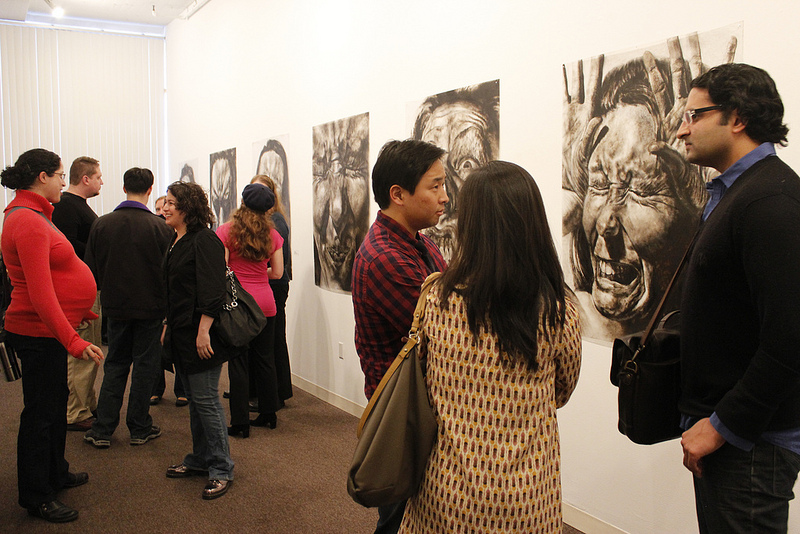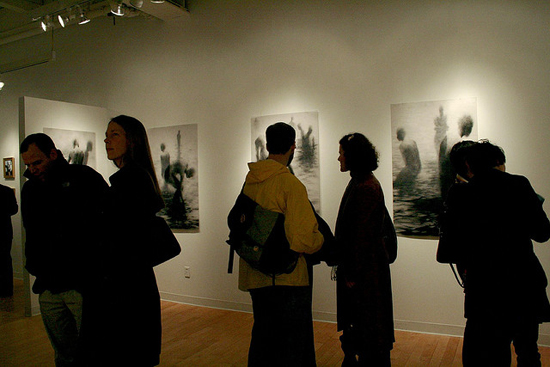"My greatest challenge has been the art and etiquette of networking in the art world. I have a friend, who is everywhere in the local art scene. Whenever there's an event or a fair, she'll be there; whenever there's the curator or the gallery owner, she'll be right next to him and chatting him up into his circle; and whenever there's a frequent or famous name, she'll make sure to Facebook friend that artist. As much as I want to expand my network as quickly as her, I'm not sure if this approach is sincere or whether I should even worry about sincerity. The last thing I want to do is come off as a "networking leech." The only time I lit a fire under my butt to talk to an artist was when I ran into Lisa Yuskavage at her solo show. Other than that, I've been lucky enough to work with famous names like Guy Gilchrist and Saya Woolfalk through schools and internships. What are your thoughts and do you have any advice on socializing in the art world?"
The truth is that success as an artist is highly contingent on the relationships you forge in the art world. There is no artist out there who can build a career on their own. You have to construct a solid network that is supportive of you and have key people who are positioned to help you advance your career.
There are essentially two levels of socializing in the art world, and both have to be simultaneously maintained to get concrete results. First, there's the saying a quick hello in person at an art event, to introduce yourself to new people and to remind others whom you already know that you exist. Every time you say hello to another professional in the arts, think of it as free advertising.

However, just attending and chatting at events barely skims the surface and won't be enough to push your career forward. Opening receptions are frequently crowded, loud and chaotic. Usually, I find myself briefly saying "hi" for a few minutes, but not much more than that. I've been introduced to and shaken hands with Sarah Sze and Michael Mazur. I was giddy with excitement to have the chance to meet them in person, but I certainly was not expecting anything in terms of fostering a real connection with them and getting results from that brief interaction. Your friend may appear to be making all sorts of connections, but it's more likely that her conversations are quite limited at these events. For these connections to go anywhere, she has to take the initiative to pursue and develop these relationships beyond the party.

As for sincerity, you need to do what you feel is appropriate for the given situation. If it feels fake to you, then it probably is. Go with your gut instinct on this one.
The second form of socializing, which I believe is significantly more important and effective, is establishing solid relationships that have depth and longevity. These are people with whom you have worked in the past in some capacity, who you make a concerted effort to see regularly in person, and with whom you have strong conversations. They might be a peer from art school, a former professor, a colleague at the school you teach at, a curator who organized one of your exhibitions, someone you took a workshop with, an artist who works in the same studio building as you, even a former student. These are the relationships that will get you the studio visits, referrals and exhibitions.
These relationships take time and patience to foster. You have to be the one to take the initiative to make these relationships happen; don't expect people to come to you. I make sure whenever I'm on campus that I'm meeting up with my colleagues for lunch, that I have quick conversations with them when we're in the faculty lounge ten minutes before class starts. I'm not afraid to call up a former professor and ask them to have a cup of coffee with me. I go to open studios events where you can meet and talk to the artists in person. Local open studio events are great to attend because you get to see tons of artwork and workspaces. Open studios tends to be less hectic than opening receptions so you're much more likely to have an in-depth conversation with an artist.
I've cultivated a wonderful relationship with one of my former professors, whom I've known and kept in touch with for over 15 years. I make sure that I see him every few months, and we get together on a regular basis to chat about our studio practices and life in general. I savor every conversation we have, and I always come away with a renewed sense of inspiration. About a year ago, I completed a large series of 50 drawings and published a comprehensive catalog. He sat down with me and gave me his personal list of curators and art dealers to send the catalog to. This is not the type of information you share with just anyone, it's because he and I have developed a level of trust over the years.
On the flip side, there's social media. While it can help to network with other artists on social media, that should be seen only as a small supplement to the relationships you're developing in real life. Friending a famous artist on Facebook doesn't tend to go anywhere. I'm friends with Eric Fischl on Facebook, but what has friending him done for me?
Ask the Art Professor is a weekly advice column for visual artists. Submit your questions to clara(at)claralieu.com
